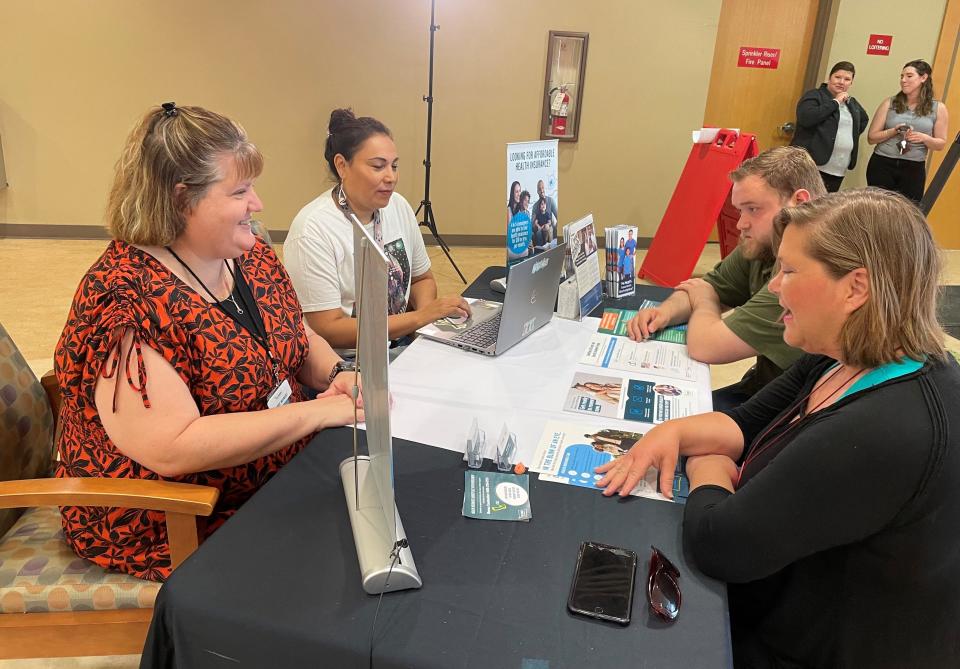South Dakota lawmakers are bringing back a Medicaid work requirement resolution in 2024
Two lawmakers are bringing back a resolution that would have South Dakotans vote on a “clarification” to Medicaid expansion that passed in 2022.
The resolution, introduced by Rep. Tony Venhuizen, R-Sioux Falls, and Sen. Casey Crabtree, R-Madison, would allow voters to decide on the 2024 ballot if the state should consider work requirements for those enrolled in Medicaid.
A similar resolution was introduced during the 2023 session by Venhuizen but failed in a Senate committee because the language had been too broad, Venhuizen said. He believes the new resolution has a good chance of heading to the voters.

Advocates against imposing work requirements on people receiving health insurance coverage through Medicaid say work requirements haven’t been successfully implemented and could negatively impact small businesses.
Remind me about Medicaid expansion
South Dakota is one of 41 states to have expanded Medicaid since 2012. The expansion of the federal health insurance program, also known as the Affordable Care Act, ensures that adults between the ages of 18 and 65 who make less than $20,000 or families of four that make less than $41,000 are eligible for coverage.
Voters passed the constitutional amendment 56%-44% in November 2022. It’s estimated that by passing Medicaid expansion, 52,000 South Dakotans became eligible for health coverage.
More: Medicaid expansion enrollment starts July 1, but some may be eligible to apply early
Expansion eligibility started in July with the state budgeting $589 million for the administrative and benefit costs and adding 68 full-time positions within the Department of Social Services to oversee the program.
As of Nov. 7, of the 122,000 South Dakotans enrolled in Medicaid, 10% are part of the expansion population, according to DSS.
What’s different about the resolution this time?
Venhuzien said the 2024 resolution focuses on narrowing the language based on a last-minute change from the 2023 resolution that was made during the Senate Health and Human Services Committee.
The new resolution focuses on placing work requirements on the portion of the Medicaid expansion population who are not physically or mentally disabled. Additionally, the state would not be able to impose the work requirement unless the federal government allowed it.
“I see it as a clarification,” Venhuzien said. “The language that was passed I believe precludes a work requirement.”
More: Minnehaha County auditor says she’s not sure she can trust county’s voting system
The goal overall, Venhuizen said, is to ensure that people getting help from government social programs are able to move up economically in the future.
“I think our social programs should be set up to incentivize work and self-sufficiency,” he said.
Currently, under the Biden administration, work requirements for the Medicaid expansion population are not allowed, according to KFF, a health information policy nonprofit group. During the Trump administration, 13 states approved work requirements as part of Medicaid, including Arkansas, which actually implemented the policy.
The Arkansas workforce policy was paused in 2019 after a quarter of people enrolled in Medicaid lost coverage due to how the program was implemented. A federal appeals court struck down the program after it ruled the work requirements were “‘arbitrary and capricious’ and failed to further the objective of the Medicaid program,” according to Healthcare Dive, a healthcare industry publication.

Venhuzien said even if the resolution were to pass in the upcoming legislative session, three things would need to happen:
It would have to pass with a majority of South Dakotans voting for the work requirement provision at the ballot box.
The federal government would have to allow for work requirements to be attached to Medicaid expansion.
The state would have to decide if the work requirements should be approved.
“All this is doing is opening the door to having that conversation at some point in the future,” he said.
Why are work requirements contentious?
Ben Hanson, the North and South Dakota Government Relations Director for the American Cancer Society Cancer Action Network, said work requirements could negatively impact small businesses by burdening them with more paperwork.
“In order to keep an employee who’s already working for them employed, in order for them to have health insurance and not have to pay for their health insurance as a small employer, they now have to fill out something with the state that they don’t necessarily understand,” Hanson said.
The resolution also doesn’t define who would be responsible for filing the work requirement verification paperwork and what division of DSS would track the responses, Hanson explained.
More: Gov. Kristi Noem asks for a $7.27 billion state budget in FY2025
Gov. Kristi Noem in her budget address on Dec. 5 called for an additional $18 million to be set aside for Medicaid expansion costs, but Hanson said that didn’t account for keeping track of the workforce requirement.
“What is the cost benefit ratio to the state? What’s the actuarial cost to the state?” he said. “I think the bill sponsors need to know that and they need to answer that because if it costs more to keep track of this than it is in savings for people who receive this… what was the point of doing it?”
Venhuizen argued that because work requirements already exist for other government social programs, such as the Supplemental Nutrition Assistance Program, similar requirements for Medicaid expansion would not be difficult to implement.
Even if the work requirement resolution passed through the steps it needed to, it would most likely be up to the Legislature to set up the parameters of the requirements, including administration and exceptions, he said.
The Sioux Falls Republican pointed to SNAP that has a list of exceptions to work requirements such as older adults, people with serious illnesses such as cancer and people with disabilities.
“There’s a number of very common sense exceptions to that and I think because those aren’t all spelled out in the amendment, some people have a fear that they won’t be provided for,” he said.
The 99th Session of the South Dakota Legislature starts on Jan. 9.
This article originally appeared on Sioux Falls Argus Leader: Lawmakers want work requirements for Medicaid expansion in 2024

